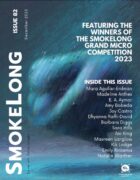I love a bildungsroman tale. You’ve given us two wayward adolescents on the cusp in “Perseids”. Even the most well adjusted among us remember the angst of 13. I found it interesting that your narrator is not gendered. Intentional? I assumed the narrator is a girl but you know what happens when you assume ….
(Not me Googling bildungsroman ….) I’ll first say I’m a believer in letting readers interpret things however they want. I may have intended one thing, but if you read meaning somewhere else, I’m all for it. So hey, make whatever assumption you want!
Leaving out the narrator’s sex was intentional, though I do tend to write from the female perspective—I’d probably have read it as female, too. I do tend to leave out key features to swing the focus at times. Leaving out the narrator’s sex draws attention to Janey’s, and also says something about the narrator as well. As we know, not saying something says something. I also tend to leave characters and narrators unnamed unless there’s a reason to name them. In this case, the narrator idolizes Janey and sees her as someone. The narrator doesn’t know themselves yet—that’s why Janey gets a name and the narrator doesn’t.
The narrator references needs and “holes to fill,” gingerly, but then very specifically lists Janey’s dad’s junk collection. At 13, it is hard to identify what we need/want. The breathless ending tells us something big awaits. I think it is the absence of information that makes this story work well. Do you use this technique a lot? Bravo if so! It’s hard to withhold!
This story was originally published in Midwestern Gothic—they used to have contests in the summer with photo prompts, and this story was inspired by a photo called “Beautiful Junk” by Dawn Olsen. The photo showed overgrown grass, a cannister of weed killer, rusted lawn mowers and a house in the background with chipping paint. I used the picture as inspiration for the setting, so those details were important to me. The “holes” were purposely ambiguous, and I wanted to reader to interpret them however they wanted based on what we know about being 13 and living in (metaphorical and physical) dangerous spaces.
I am also wary of clichés that show broken kids in broken homes, so I didn’t want to do that. I wanted to show kids growing up despite their environment, not necessarily being a product of it. The narrator is looking back on this moment, so they can see the holes that Janey was filling. As kids, we just cling to what we need to survive. The narrator needed Janey. Janey helped them survive.
I love the “stellar” spacey language in “Perseids”—your ethereal and screaming rockets and explosions. Not only is the wording poetic but a subtle nod to the title is as well. Does poetry influence your work?
I am in awe of poets because I wish I was one. I love poetry and find so much comfort it in it. I’m not sure if it influences me, but I suppose the things we read do influence us in some way. I wish I could write poetry like Kate Baer, for instance. Her poetry speaks to me and makes me feel like it was written just for me. I hope I can one day write in a way that makes people feel that connected and seen. That’s the whole point of writing, to me.
At 13, what were you reading and did you have a Janey?
At 13 I was reading a lot of Greek mythology (we read Edith Hamilton’s Mythology in school and I fell in love). I think I also read To Kill a Mockingbird and “The Lottery” for the first time around that time. I had an amazing English teacher in eighth grade who pushed us to really talk about books and think beyond the surface, which set up an early love for reading and dissecting literature (shout out to Mr Babinec!).
I didn’t have a Janey in the sense of this story because I am not like the narrator of this story; this is a story about surviving and discovery, and I had a very stable, healthy childhood for the most part. That said, my childhood best friend is still my best friend today—I’ve always seen her as having a magnetic, ethereal pull, and our friendship has survived a lot of trauma and growth. She emits light and I was always happy to be close enough to catch some of her glow.
Please tell us your favorite literary teen (as long as it is not Holden Caulfield). I kid (sort of).
Why not Holden? I think my honest answers are probably worse ….
I’m sure there are some very cool literary teens that would make me seem edgy and well read, but honestly, I’d say Bella Swan (I like Twilight, so sue me!), Katniss Everdeen, and Liesel Meminger.



 The core workshop of SmokeLong Fitness is all in writing, so you can take part from anywhere at anytime. We are excited about creating a supportive, consistent and structured environment for flash writers to work on their craft in a community. We are thrilled and proud to say that our workshop participants have won, placed, or been listed in every major flash competition. Community works.
The core workshop of SmokeLong Fitness is all in writing, so you can take part from anywhere at anytime. We are excited about creating a supportive, consistent and structured environment for flash writers to work on their craft in a community. We are thrilled and proud to say that our workshop participants have won, placed, or been listed in every major flash competition. Community works.